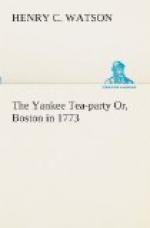“It appears that the Indian girl, who was an especial favourite and domesticated in the family, had overheard the intentions of Rugsdale to betray the American General, and other valuable officers, that evening, into the hands of the British, for which purpose they had been invited to this ‘feast of Judas.’ Hating, in her heart, the enemies of America, who had driven her tribe from their native forests, she resolved to frustrate the design, and consequently waylaid the steps of Washington, as we have described, but failing in her noble purpose, she had recourse to the party left in possession of the boat.
“Scarcely had she given the information, and night closed round, when a company of British soldiers were discovered making their way rapidly towards the banks of the Hudson, within a short distance of the spot where the American party was waiting the return of their commander. Bold in the cause of liberty, and knowing that immediate action alone could preserve him, they rushed upon and overpowered them, bound them hand and foot, placed them with their companions, and sent them to the American camp at West Point. Having disguised themselves in the habiliments of the enemy, they proceeded to the house of Rugsdale, where, at the appointed time and sign made known by the Indian, they opportunely arrived to the relief of Washington, and the confusion of the traitor.”
“Who told you that story?” enquired Kinnison.
“An old friend of mine, named Buckram; he was one of the men who disguised themselves,” replied Colson.
“I’m inclined to believe it’s a tough yarn,” said Kinnison. “It’s true enough to the character of Washington. He never let his feelings swerve him from the strict line of duty. But all that stuff about the Indian girl is somebody’s invention, or the most extraordinary thing of the kind I’ve heard tell of. I don’t doubt your friend’s veracity, but it’s a tough yarn.”
“Probable enough,” remarked Hand.
“It’s a very pretty story,” said Ransom, “and I’m inclined to swallow it as truth.”
“I’m satisfied of its truth,” said Colson. “But I wouldn’t ask any of you to believe it, if there’s anything in it staggers you.”
“I think Rugsdale was served as all such traitors in such times should be served,” said Hanson. “Hurra! for Gineral Washington.”
“Three cheers for General Washington!” suggested Hand, and the three cheers were given. A song was called for by several voices, and a young man volunteered to favour the company with “Liberty and Washington,” the song which follows:—
When Freedom, from her starry
home,
Look’d down
upon the drooping world,
She saw a land of fairy bloom,
Where Ocean’s
sparkling billows curl’d;
The sunbeams kiss’d
its mighty floods,
And verdure clad
its boundless plains—
But floods and fields and
leafy woods,
All wore alike
a despot’s chains!
“Be free!” she
cried, “land of my choice;
Arise! and put
thy buckler on;
Let every patriot raise his
voice
For Liberty and
Washington!”




